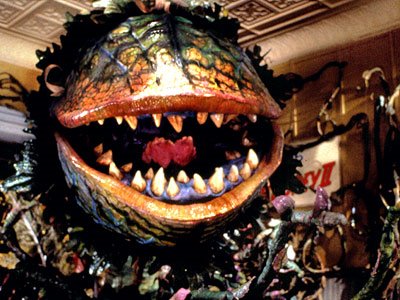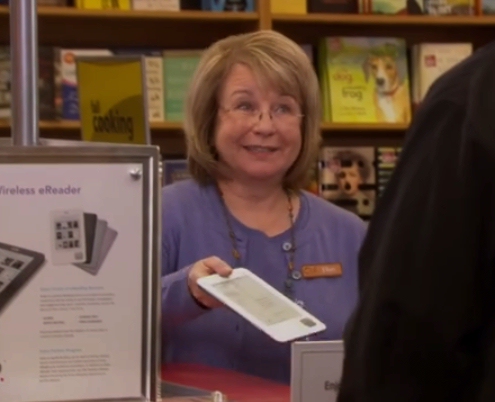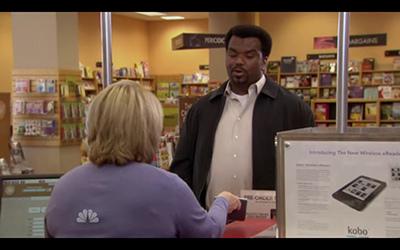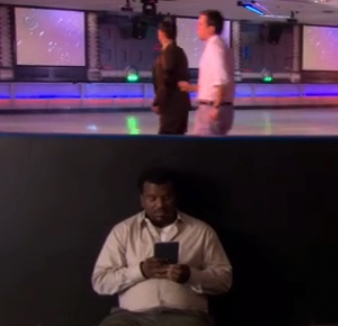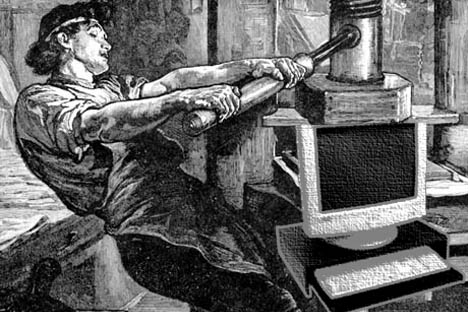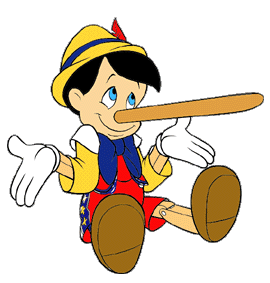
A very funny skit just aired on The Daily Show with Jon Stewart. Returning from a commercial break, Stewart switched to a cultural news story — the demise of Borders bookstores — in a knowing, affectionate segment with a contrary look at writers and book-sellers.
JON STEWART: Books! You know them as the thing Amazon tells you “You might be interested in…” when you’re buying DVDs. But did you know books used to be available in what were called… “bookstores”? Well they were…
FOX NEWS: The bookstore chain Borders is going out of business.
CBS NEWS: Borders just could not keep up with 21st century technology and trends.
CBS NEWS: The latest brick-and-mortar victim of a digital age…
JON STEWART: Borders! Now where am I going to return all my guests’ books for store credit?!
For more we turn to resident expert John Hodgman! Now let me ask you, how can — how can the beloved bookstore, an institution, compete with downloading and mail order books?
JOHN HODGMAN: Well, Jon, it’s not going to be easy. People have gotten used to the convenience of having books delivered right to them. If bookstores want to compete, they have to give the customer a better home experience than they can get in their own homes.
JON: So you’re saying re-create…
HODGMAN: Exactly, Jon.
JON: I didn’t finish what I was saying. The — the…
HODGMAN: I wasn’t listening.
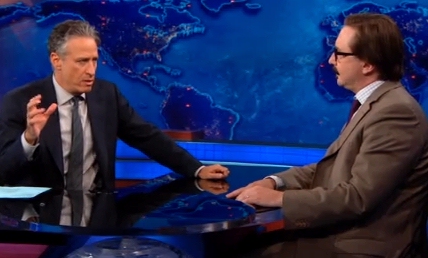
HODGMAN: What I’m talking about is getting rid of all those old-fashioned bookshelves, and replace them — with beautiful, well-appointed downloading pods. Book-lovers simply seal themselves inside, strip down to their underwear, pick up a cold slice of pizza, and start downloading the great works of literature… It’s all the fun and isolation of home, with the inconvenience of a 20-minute car ride.
JON: There’s stuff bookstores can do…
HODGMAN: Uh-huh.
JON: …that the internet can’t!
HODGMAN: Oh, you mean like shelter the homeless?
JON: I’m talking about having authors visit stores!
HODGMAN: Oh, well now we’re just splitting hairs. The reality is, there’s nothing more depressing than seeing some pasty shut-in author bare his soul in front of a half-filled row of folding chairs. Believe me, I know! (Picture of John Hodgman appearing at a Borders bookstore)
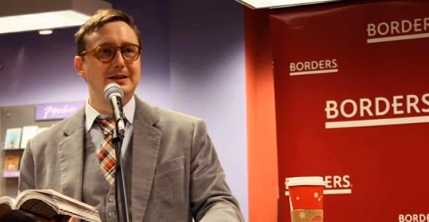
JON: So what — what is the alternative to this?
HODGMAN: Well, instead of hosting readings, why not host exciting live writings? Bring the author in, tie him to a desk, and make him write a novel to order. Customers can shout out their own ideas while pelting the writer with $4.00 scones. It’ll be fun! George R. R. Martin not finishing that new “Game of Thrones” book fast enough for you? Well maybe some hot chai latte down his neck will speed him up. (Picture of angry reader dumping latte on the bearded author)
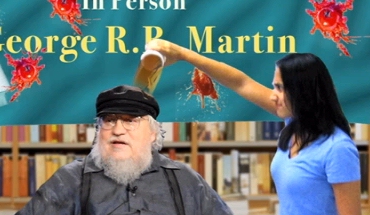
JON: You know, I’m not sure a lot of authors would agree to that sort of thing.
HODGMAN: Well, Jon, I think you’re underestimating authors’ desire for free chai. And, the occasional human touch.
JON: But see, that brings up an interesting point. What about the human element? Bookstores build a personal relationship with their customers you simply cannot get from a computer. There are, uh, employee interactions, employee recommendations…
HODGMAN: Oh yes, yes. Thank you. Employee picks. Thank you, pudgy neck-beard counter guy, for clueing me in to Philip K. Dick — again. What’s the matter, are you sold out of Confederacy of Dunces this week…? But you do raise a good point, Jon. Bookstores employ a very special class of condescending nerd. These are the types of people who used to work at video stores (before they went under).
JON: Where were they before that?
HODGMAN: Record stores, obviously. It’s been a tough couple of years for condescending nerds. And if bookstores fall, Jon, America will be inundated with a wandering, snarky underclass of unemployable purveyors of useless and arcane esoterica.
JON: I’m not sure I understand.
HODGMAN: No, well you wouldn’t.
JON: You seem to hate bookstore employees.
HODGMAN: Oh, I loathe them, Jon. They shelved my books under “Humor”, Jon! Not “Witticism”, as I asked! I ask you, do I look like Marmaduke to you?
JON: (Laughing stupidly) Marm– Marmaduke is a very big dog. Hee hee hee hee hee! Hee hee! Ahh! Ahh…
HODGMAN: Pathetic. We have to face facts, Jon. The big-box bookstore has passed into history. And that’s something we should embrace and be proud of. By preserving Borders as a popular historical attraction.
JON: Like, uh, colonial Williamsburg?
HODGMAN: Well yeah, exactly! Bring the kids down to Ye Olde Borders Towne! Let them see what it felt like to paw through a clearance bin of Word-a-Day calendars. Or sneak a peek at pornography printed on actual paper! Right there on the giant rack of weird magazines you’ve never heard of. Including my personal favorite, Bookstore Magazine Rack Aficionado magazine.
JON: You know, I think a bookstore preserve might appeal to a — a very small market.
HODGMAN: Well, it can’t be smaller than the market of people who buy books anyway! This is what it’ll be like. (Puts on a colonial hat) “Hey! Gather round, young ‘uns, and come see how we used to sell this here itty bitty book light. Because in the One-nine-eighties, pages didn’t glow, and eyestrain was a sign of wealth!
JON: Ladies and gentlemen, we’ll be right back.

